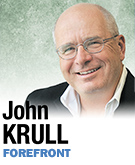Subscriber Benefit
As a subscriber you can listen to articles at work, in the car, or while you work out. Subscribe Now
 Mitch Daniels’ letter inviting the candidates who want to succeed him as governor to weigh in on how Indiana should implement parts of President Obama’s health care reform law demonstrates at least two things.
Mitch Daniels’ letter inviting the candidates who want to succeed him as governor to weigh in on how Indiana should implement parts of President Obama’s health care reform law demonstrates at least two things.
The first is that the health care debate has become even more complicated—and, therefore, fraught with peril and opportunity for political leaders.
The second is that the June 28 U.S. Supreme Court ruling upholding the health care package—including the individual mandate to have insurance—changed the field politicians expected to fight on this fall.
Let’s deal with that second reality first.
The speculation leading up to the decision was that the Supreme Court would overturn the law.
Because the expectation was that the law would be struck down—or at least its fate was up in the air—no one wanted to put a structure in place that would have to be torn down.
That, in part, is why the Daniels administration has waited two years for an answer from the federal government about whether expanding the Healthy Indiana Plan would be an OK way to cover Hoosiers newly eligible for Medicaid.
The unexpected Supreme Court ruling also explains why politicians have been tentative in their discussions of the health care reform package in the past few weeks. If the court had struck down the law, the script would have been simple.
Republicans would have crowed about the fact that a wise group of justices had reined in an out-of-control president and his party. Democrats would have hyperventilated about a group of Republican appointees to the court turning the Constitution on its head and throttling the political process for partisan reasons.
Instead, the court upheld the law, which means politicians have to deal with it as a reality, rather than just a talking point.
That brings us back to the first point about how complicated the debate has become.
Daniels hasn’t hidden the fact that he doesn’t like the health care law. He’s said that an expansion of Medicaid would cost the state $2 billion between 2012 and 2020.
Daniels’ critics say that his numbers are too high because they’ve been cobbled together from worst-case scenarios not intended to be serious planning tools. They also note that his record when it comes to cost projections is not perfect. While director of the Office of Management and Budget in George W. Bush’s White House, Daniels famously projected to The New York Times that the cost of the Iraq War would be $50 billion to $60 billion. The most recent accountings for Iraq War costs put the number somewhere north of $1 trillion.
That said, there will be costs to having Indiana implement the health care law.
There also likely will be benefits, which is what complicates things.
For the past three years, the debate over health care has been almost exclusively about costs, not about any of the benefits.
That is changing now. While polls still indicate that Americans do not like “Obamacare” in general, many of the individual provisions—the protections dealing with pre-existing conditions and keeping children on one’s insurance until they’re 26, for example—within the law they like a great deal. And those individual provisions will become part of the landscape soon.
It’s one thing to argue with a concept. It’s another thing altogether to deny reality.
What Daniels’ letter to the candidates demonstrates is that health care reform likely is here to stay and that there now are real choices that have to be made—choices that will have consequences whichever way the state goes.
His invitation could be the start of something special, a truly mature and rational conversation about health care and what it means for Hoosiers.
Let’s hope the men who want to succeed Daniels take him up on the offer.•
• Krull directs Franklin College’s Pulliam School of Journalism, hosts the weekly news program “No Limits” on WFYI-FM 90.1, and is executive director of The Statehouse File. Send comments on this column to ibjedit@ibj.com.
Please enable JavaScript to view this content.
